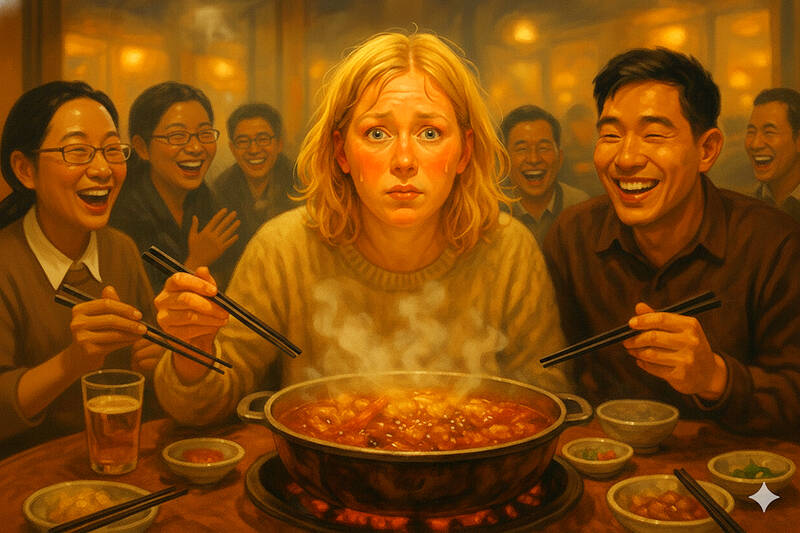★ Bilingual Story is a fictionalized account. 雙語故事部分內容純屬虛構。
Kevin leaned over the bubbling pot. “Hey. . . are you okay? You’ve barely touched your food.” Zoey blinked. Her face was red — not from blushing, but from the “mala” spice and the heat of the room. Her blond hair clumped to her face like strands of fine spaghetti. Her carefully applied makeup now streaked.
“This isn’t what I expected,” she said softly, forcing a smile. All around them, Kevin’s friends were laughing, shouting, and tossing ingredients into the broth. The air smelled of chili oil and garlic. And so did her clothes.

Photo: ChatGPT 照片:ChatGPT
Zoey had imagined a quiet, romantic evening for their first date. Maybe some wine, candles. She thought hot pot was like fondue from her native country: smooth cheese and warm French bread. Slow conversation. Eye contact. But this? This was chaos. Loud, confusing chaos.
Kevin sensed her disappointment. He smiled and explained: “This is Taiwan. This is winter. We eat hot pot with friends. It’s loud. It’s messy. But it’s how we connect.” He dipped a thin slice of beef, swirled it in the boiling broth for just a few seconds, then into a small dish of sesame sauce and green onions. He placed it in her bowl.
“Try this.” She hesitated. Then took a bite. It was spicy. It was rich. It was. . . kind of delicious. Someone offered her a beer. She took it, clinked glasses with him, and laughed for the first time. She still felt sticky. But she was starting to feel at home next to the hot pot heat on a chilly winter evening.
凱文靠向滾燙的火鍋鍋邊。「欸??妳還好嗎?妳幾乎沒怎麼吃耶。」柔伊眨了眨眼。她的臉很紅——不是因為害羞而臉紅,而是因為麻辣的辣味和房間裡的熱氣。她的金髮黏在臉上,像一束束細緻的義大利麵。精心化好的妝現在都花了。
「這跟我想像的不太一樣。」她勉強擠出一個微笑,小聲說。他們周圍,凱文的朋友們笑聲不斷、大聲聊天、把各種食材往鍋裡丟。空氣中瀰漫著辣椒油和蒜頭的氣味。她的衣服也沾染了這些味道。
柔伊原本以為第一次約會會是個安靜又浪漫的夜晚。也許有紅酒、有蠟燭。她以為火鍋就像她家鄉的起司鍋:濃郁的起司和溫熱的法式麵包,慢慢聊天、眼神交流。但現在這場景——這簡直就是一團混亂。吵雜又讓人困惑的混亂。
凱文察覺到她的失望。笑著解釋:「這就是台灣。這就是我們的冬天。我們跟朋友一起吃火鍋。雖然很吵很混亂。但這就是我們聯繫感情的方式。」他夾起一牛肉片,在滾燙的湯底裡涮了幾秒鐘,然後再放進一小碟芝麻醬和蔥花裡。他把它放到她的碗裡。
「嚐嚐這個。」她猶豫了一下,然後咬了一口。辣辣的,味道很濃郁,其實還滿好吃的。有人遞給她一瓶啤酒。她接過來,跟凱文乾杯,這是她今晚第一次笑出來。她還是覺得黏黏的、不太舒服。但在這個寒冷的冬夜、火鍋的熱氣旁,她開始感受到一點家的味道。
故事討論
Zoey, a Swiss raised on fondue with slow dips of French bread into melted cheese, wine, candlelight, arrived expecting a quiet, intimate evening. She was confused when Kevin’s hot-pot table turned into a loud food festival: broth boiling, friends shouting, and meat flying into the pot. Fondue and hot pot are winter cousins, both about warmth and sharing, but their manners feel very different.
Every November in Taiwan the air cools and people look forward to gathering around bubbling pots with friends and family. Hot pot answers the cold with warmth, shared food, and friendly chatter. It’s practical (warm hands, fast food) and social (conversations between steam and chopsticks). For Zoey and Kevin, the mala table turned an awkward first date into a closer connection and cultural appreciation.
柔伊是瑞士人,從小吃習慣起司鍋——融化的起司慢慢沾著法國麵包,搭配紅酒與燭光,她原本以為今晚的約會也會是靜謐又親密的夜晚。但當凱文帶她走進火鍋店時,眼前卻是一場熱鬧的美食嘉年華:湯底咕嚕咕嚕地滾著、朋友們大聲聊天、各種肉片在空中飛舞著落入鍋中。起司鍋與火鍋都是冬天的好夥伴,都講求溫暖與分享,但它們的「用餐禮儀」卻截然不同。
每年11月在台灣,氣溫開始轉涼,人們期待著與親朋好友圍繞著滾燙的鍋子聚會。火鍋是對寒冷的回應——用熱氣、共享的食物與熱絡的聊天來驅走冷意。它既實用(暖手、快速煮食),又社交(在蒸氣與筷子間展開對話)。對柔伊和凱文來說,這桌麻辣火鍋,讓原本尷尬的第一次約會,變成一次更深的連結與文化理解。
Top 3 Dos
1. Use communal serving chopsticks or tongs for raw ingredients (hygiene and courtesy).
2. Swish thin meat slices briefly. A few seconds keeps them tender.
3. Offer/share food. Passing a good piece is a small act of care.
Top 3 Don’ts
1. Don’t double-dip already-eaten food into the communal pot or sauce.
2. Don’t overcook leafy vegetables until they fall apart.
3. Don’t hoard the best cuts. Share them around the table.
火鍋三要
1. 用公筷或夾子夾取生食(衛生又禮貌)。
2. 薄肉片涮幾秒就好,口感才會嫩。
3. 主動分享食物,把好吃的夾給對方,是一種貼心的小舉動。
火鍋三不
1. 吃過的食物不要再回鍋或沾醬(避免交叉污染)
(俗稱「重複沾醬」)。
2. 菜葉類不要煮太久,煮到爛掉就可惜了。
3. 不要獨佔好料,記得大家一起分享。
Vocabulary 單字片語
Vocabulary 單字片語
1. hot pot 火鍋
2. broth 湯底/湯
3. mala 麻辣(numbingly spicy)
4. ingredient 食材
5. beef slice 牛肉片
6. dip / swish 浸、泡、涮
7. communal 公用
8. dipping sauce 醬料、沾料
9. share 分享
10. hoard 獨佔
Idioms 相關成語
1. double-dip 重複沾醬
(動詞︰重複沾取「公用沾醬」;名詞︰double-dipping / double-dipper
2. eye contact 眼神交流
3. connect (with people) 聯繫感情
Nigel P. Daly is a writer with a language learning newsletter called Chin-glish bilingual lab (https://ndaly.substack.com).
Cynthia Chen is a translator and writer specializing in blogs, scripts and articles.

Have you ever seen a circular intersection where cars continuously flow in one direction around a central island? That is a “roundabout,” a well-known alternative to traditional intersections. Drivers enter and exit at different points without relying on traffic lights. Their primary purpose is to improve traffic flow and minimize the likelihood of high-speed collisions, particularly dangerous T-bone and head-on crashes. Roundabouts have existed and been implemented for over a century. In the 1960s, the modern roundabout emerged in the UK, with added rules for yielding. Unlike intersections with red lights, roundabouts allow vehicles to continue moving at a

A: So you’re reading Jin Yong’s martial arts novel again? B: Yup, Jin’s novels are so fascinating, especially the trilogy: “Legends of the Condor Heroes,” “Return of the Condor Heroes,” and “Heaven Sword and Dragon Saber.” A: The late novelist published his first story in 1955, which means this year marks the 70th anniversary of his “wuxia” world. B: Wasn’t an English version of “Legends of the Condor Heroes” also released in 2018? A: Yes, but the debate over the translation of kung fu moves continues — like the evil move “Nine Yin Skeleton Claw.” A: 你又在重讀金庸的武俠小說啦? B:

If you’ve recently spotted adults parading around with cuddly toys dangling from their designer handbags, your eyes haven’t been deceiving you. The playful trend of adorning bags with cute charms has become popular among people of various ages. Plushies like Labubu and anime and manga characters such as Chiikawa have become must-have accessories that make personal statements. The practice of attaching charms to personal items has been common across cultures throughout history. In ancient civilizations, charms were often used as symbols of protection, good luck, or identity. Fast-forward to more modern times, and style icons like Jane Birkin, a

A: Apart from Jin Yong, the late martial arts novelists Liang Yusheng and Gu Long were also very popular. B: Wasn’t Liang a pioneer of the “new school” wuxia genre in the 20th century? A: Yup, I really like his Tianshan mountain series. All the characters — such as the “White Haired Demoness” — are so vivid. B: The roles in Gu’s books are lively, too — like the “Fragrant Commander” Chu Liuxiang. A: And the TV drama adapted from the Chu Liuxiang series swept across Taiwan in the 1980s, with ratings surging over 70 percent at that time.